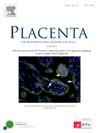生长分化因子-8通过增加ANGPTL4的表达促进人上皮外滋养细胞的侵袭
IF 3
2区 医学
Q2 DEVELOPMENTAL BIOLOGY
引用次数: 0
摘要
适当调节上皮外滋养细胞(EVT)的侵袭对胎盘的正常发育和功能至关重要。血管生成素样4 (ANGPTL4)是一种多功能蛋白,以前曾被认为与促进EVT细胞侵袭有关。生长分化因子-8 (GDF-8)是转化生长因子-β (TGF-β)超家族的一员,也会刺激EVT细胞侵袭。然而,目前尚不清楚GDF-8是否调节ANGPTL4的表达,以及这种调节如何促进人类EVT细胞的侵袭行为。本研究旨在探讨ANGPTL4在gdf -8诱导的EVT细胞侵袭中的作用,并揭示其潜在的分子机制。方法采用永生化EVT细胞株HTR-8/SVneo和人原代EVT细胞作为体外模型。采用RT-qPCR和Western blot分析GDF-8对ANGPTL4表达的影响及其潜在的信号机制。使用MTT法评估细胞活力,使用matrigel涂层transwell侵袭法检测细胞侵袭性。结果GDF-8增加了ANGPTL4的表达。在机制上,我们发现激活素受体样激酶4和5 (ALK4和ALK5)是gdf -8介导的ANGPTL4上调所必需的。此外,SMAD2和SMAD3都参与了这一调控途径。我们进一步表明,GDF-8处理促进细胞侵袭而不影响细胞活力。下调ANGPTL4可减弱GDF-8的促侵袭作用,而过表达ANGPTL4可增强细胞侵袭性。本研究揭示了GDF-8在调节ANGPTL4表达和EVT细胞侵袭中的新作用,为胎盘发育和妊娠相关疾病的潜在影响提供了新的见解。本文章由计算机程序翻译,如有差异,请以英文原文为准。
Growth differentiation factor-8 promotes human extravillous trophoblast cell invasion by increasing ANGPTL4 expression
Introduction
Proper regulation of extravillous trophoblast (EVT) cell invasion is critical for normal placental development and function. Angiopoietin-like 4 (ANGPTL4), a multifunctional protein, has previously been implicated in promoting EVT cell invasion. Growth differentiation factor-8 (GDF-8), a member of the transforming growth factor-β (TGF-β) superfamily, also stimulates EVT cell invasion. However, it remains unclear whether GDF-8 regulates ANGPTL4 expression and how this regulation contributes to the invasive behavior of human EVT cells. This study aims to explore the role of ANGPTL4 in GDF-8-induced EVT cell invasion and to uncover the underlying molecular mechanisms.
Methods
The immortalized EVT cell line HTR-8/SVneo and primary human EVT cells were used as in vitro models. The effects of GDF-8 on ANGPTL4 expression and the underlying signaling mechanisms were investigated using RT-qPCR and Western blot analysis. Cell viability was assessed using the MTT assay, and cell invasiveness was examined using a Matrigel-coated transwell invasion assay.
Results
Our results demonstrated that GDF-8 increased ANGPTL4 expression. Mechanistically, we found that activin receptor-like kinases 4 and 5 (ALK4 and ALK5) were required for GDF-8-mediated upregulation of ANGPTL4. Additionally, both SMAD2 and SMAD3 were involved in this regulatory pathway. We further showed that GDF-8 treatment promoted cell invasion without affecting cell viability. The pro-invasive effect of GDF-8 was attenuated by ANGPTL4 knockdown, whereas ANGPTL4 overexpression alone enhanced cell invasiveness.
Discussion
This study reveals a novel role for GDF-8 in regulating ANGPTL4 expression and EVT cell invasion, offering new insights into placental development and potential implications for pregnancy-related disorders.
求助全文
通过发布文献求助,成功后即可免费获取论文全文。
去求助
来源期刊

Placenta
医学-发育生物学
CiteScore
6.30
自引率
10.50%
发文量
391
审稿时长
78 days
期刊介绍:
Placenta publishes high-quality original articles and invited topical reviews on all aspects of human and animal placentation, and the interactions between the mother, the placenta and fetal development. Topics covered include evolution, development, genetics and epigenetics, stem cells, metabolism, transport, immunology, pathology, pharmacology, cell and molecular biology, and developmental programming. The Editors welcome studies on implantation and the endometrium, comparative placentation, the uterine and umbilical circulations, the relationship between fetal and placental development, clinical aspects of altered placental development or function, the placental membranes, the influence of paternal factors on placental development or function, and the assessment of biomarkers of placental disorders.
 求助内容:
求助内容: 应助结果提醒方式:
应助结果提醒方式:


